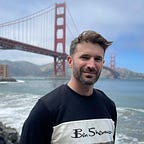Say no.
--
Look how short that title was?
Some things don’t need embellishment. But they tend to be the hardest to put into practice.
For those of us working in and around technology we are trapped somewhere between an increasing awareness of the importance of disciplined defence of our time and attention, and an increasing assault on it.
Attention is currency. Nir Eyal might have written about personal awareness of the strategies of distraction in Hooked, but… we know and we are hooked all the same. Not just on devices and distraction, but the underlying desire to say “yes”.
It goes deeper than devices — a problem that the startup and tech ecosystem seems to overlook while it breathlessly over-engineers objects to save us from ourselves. Which is fine, I’m cheering along on the sidelines for each new offering for “digital detox”, but I’m also taking a few deep breaths for the hardest thing to do.
And that’s just saying “no”.
In Alison Hill’s excellent book Stand Out, an almost overwhelming compression of truth bombs, the emotional reality of “yes” is made painfully clear.
Fear.
Often the habit of saying “yes” is tied to a desire to please. First it manifests simply out of flattery of being asked — one out of seven billion people on the planet!
But then it escalates along a pattern of being overstretched, of not being able to deliver, of a shame spiral that triggers emotional and communicative withdrawal, and of continuing this crazy pattern out of worry that if we say “no” we won’t be asked again.
Before you read on — take a moment to pause and check how you’re feeling after that last paragraph. What kind of response did you just have? Does any of that sound familiar?
If it doesn’t, you’re both in the minority and a better person than I am. And most of the people I know. And humans in general. On the entire planet. Ever.
The Beatles were right…
When communicating to CEO’s, Alison likes to frame the ability to say “no” as a multiplier of effectiveness. Specifically that “the way to get clear on what to take on board and what to say ‘no’ to comes from knowing where you can make your biggest impact”.
That’s great. But as an external lens it perhaps overlooks self awareness while promoting a constant focus on achievements. It’s easy for those of us in leadership or community roles to skim across the surface when the real hard work lies in the heart of things. Almost literally when considered with an internal lens focusing from two different angles:
- Self love says that these patterns of overcommitment are a sign to ease back a little and focus on the underlying issues first. This can and will take as long as it needs. And that’s okay — we’ve all got the same homework.
- Tough love says that overcommitting and under-delivering is flat out wasting the time of those investing their trust in the ability to execute on what’s promised. It’s not just one life but other people’s lives being affected. And that’s not okay.
The upside is that the cheap high of having yet another shiny distraction or request for attention is nothing compared to the genuine and compounding rewards of achieving both personal growth and actual achievements.
There’s a reason why Buddhism almost obsesses over meaningful work. A lot of it seemingly swinging axes and chopping wood. Even Henry Ford is attributed with “chop your own wood and it will warm you twice”. It takes presence and focus to actually do something worth actually doing.
A roadmap to “no”where
Ending with an example, we can draw from Alison once again with this simple paragraph that covers all of the bases of not just saying “no”, but explaining why in a manner that both allows for future requests and highlights the other work being done.
“Although usually I would jump at the chance, right now I have too much on my plate to do it justice. But another time I would welcome the opportunity to do it.”
What do you think? What works best for you?
Thanks for reading. I’ve set myself a personal challenge of writing and publishing daily for the month of March. Partly as an exercise in lean writing and partly to explore the impact of contributing these quick and raw narratives. This was day 15’s post — what did you think?
